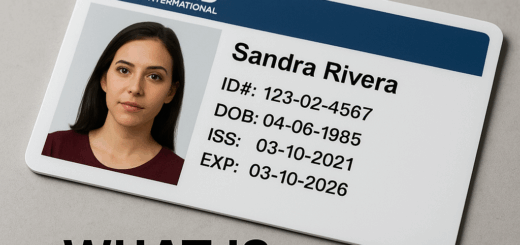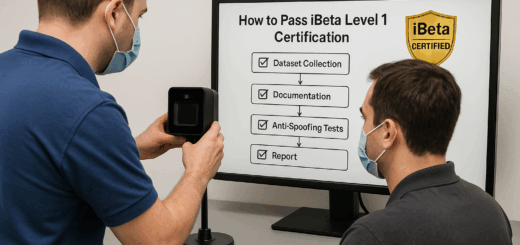What Is iBeta Dataset? A Deep Dive
When exploring biometric security and Presentation Attack Detection (PAD), one frequently encounters references to the iBeta dataset. While iBeta is best known as a quality assurance and biometric testing lab, the term “iBeta dataset” often arises in the context of biometric evaluation standards and testing procedures.
Let’s unpack what it means, its purpose, and how it is used in the world of identity verification.

1. Defining the iBeta Dataset
The iBeta dataset refers to the controlled collection of biometric samples used during iBeta’s standardized liveness detection and PAD certification tests. Unlike public biometric datasets (such as open-source fingerprint or face databases), the iBeta dataset is proprietary, closed, and built under strict laboratory conditions to ensure accuracy, consistency, and fairness in testing.
In simpler terms:
- It is not a dataset anyone can freely download or use.
- It exists as part of iBeta’s testing process to validate biometric systems under ISO/IEC 30107-3 PAD standards.
2. Purpose of the iBeta Dataset
The iBeta dataset serves several critical functions:
- Testing Spoofing Attempts
- Includes presentation attacks such as printed photos, 3D masks, silicone molds, or deepfake videos.
- Used to check if biometric systems mistakenly accept fraudulent samples.
- Evaluating Liveness Detection
- Contains genuine biometric samples from live volunteers.
- Ensures systems correctly distinguish real users from attacks.
- Measuring Performance Metrics
- Helps calculate FAR (False Accept Rate), FRR (False Reject Rate), and SFAR (Spoof False Accept Rate).
- Helps calculate FAR (False Accept Rate), FRR (False Reject Rate), and SFAR (Spoof False Accept Rate).
- Standardizing Certification
- Provides a consistent baseline dataset across all clients, making certification results fair and comparable.
- Provides a consistent baseline dataset across all clients, making certification results fair and comparable.
3. Characteristics of the iBeta Dataset
The dataset is specifically designed for controlled testing, not for algorithm training. Its main characteristics include:
- Diversity of Attacks: From low-cost printouts to sophisticated 3D fabrications.
- Limited Public Access: Proprietary and securely stored to prevent misuse.
- Compliance-Oriented: Built around ISO/IEC 30107-3 and FIDO Biometric Certification requirements.
- Volunteer-Based Collection: Genuine samples come from real human subjects under lab supervision.
- Dynamic Updates: Regularly updated to include new types of spoofing techniques.
4. How iBeta Dataset Is Used in PAD Levels
| PAD Level | Role of iBeta Dataset | Spoof Types Covered |
| Level 1 | Dataset includes simple spoofs and live samples | Photos, video replays, paper masks |
| Level 2 | Dataset expands to advanced spoofs | 3D masks, latex/silicone models, advanced forgeries |
| Future Levels | Dataset evolves with new threats | AI-generated deepfakes, synthetic biometrics |
This structured dataset enables repeatable testing and ensures that each biometric system undergoes consistent challenges.

5. Difference Between iBeta Dataset and Public Biometric Datasets
It’s easy to confuse the iBeta dataset with large-scale biometric databases. Here’s how they differ:
| Aspect | iBeta Dataset | Public Datasets (e.g., LFW, CASIA) |
|---|---|---|
| Purpose | Certification & PAD testing | Research & algorithm training |
| Access | Proprietary, lab-controlled | Freely available or licensed |
| Content | Spoof + live samples under test conditions | Mostly genuine biometric images/videos |
| Use Case | Security certification & compliance | Academic and industrial research |
6. Why the iBeta Dataset Matters
The existence of the iBeta dataset is crucial for industries that depend on secure biometric authentication:
- Consistency in Certification
- Ensures that every vendor’s biometric system is tested against the same challenges, making certifications comparable.
- Ensures that every vendor’s biometric system is tested against the same challenges, making certifications comparable.
- Neutral & Independent
- Prevents bias since companies cannot influence the dataset—it is managed independently by iBeta.
- Prevents bias since companies cannot influence the dataset—it is managed independently by iBeta.
- Adaptation to Emerging Threats
- Regular updates allow the dataset to evolve as new attack methods emerge (e.g., AI-driven deepfakes).
- Regular updates allow the dataset to evolve as new attack methods emerge (e.g., AI-driven deepfakes).
- Trust in Compliance
- Organizations can claim iBeta PAD certification, backed by an impartial dataset and methodology.
- Organizations can claim iBeta PAD certification, backed by an impartial dataset and methodology.
7. Limitations of the iBeta Dataset
While highly effective, the iBeta dataset does have some limitations:
- Not for Algorithm Training: Companies cannot use it to “teach” their systems; it is only for evaluation.
- Closed Access: Researchers cannot openly benchmark algorithms against it.
- Scope-Restricted: Focused primarily on PAD and certification, not broader biometric recognition research.
8. Future of iBeta Dataset
The future role of iBeta datasets will likely expand as new biometric technologies and spoofing threats evolve:
- Deepfake & Synthetic Media: Incorporation of AI-generated attacks for more robust PAD testing.
- Multimodal Biometrics: Expansion from fingerprints and facial recognition to include voice, iris, and behavioral biometrics.
- Bias & Fairness Testing: Datasets tailored to evaluate demographic fairness, preventing discrimination in biometric systems.
- Regulatory Alignment: Datasets adapted to meet growing compliance requirements in finance, healthcare, and government.
9. Related Topics
- iBeta dataset, biometric dataset, presentation attack dataset
- liveness detection dataset, spoof detection data
- ISO/IEC 30107-3 dataset, PAD testing dataset
- FIDO biometric dataset, anti-spoofing dataset
- genuine vs spoof samples, biometric evaluation dataset
Conclusion
The iBeta dataset plays a pivotal role in the global biometric security ecosystem. Unlike public biometric collections, it is a proprietary, controlled dataset specifically designed for certification testing of liveness detection and spoof resistance. Its closed nature ensures neutrality, fairness, and credibility, giving biometric vendors and end-users confidence that systems are truly resistant to fraudulent attempts.
As biometric authentication expands into more critical sectors, the iBeta dataset will continue to evolve, incorporating new threats, modalities, and fairness checks—cementing its place as the gold standard in biometric evaluation.
FAQs
The iBeta dataset is a controlled collection of biometric samples used to test system performance and spoof resistance.
It is created using real and artificial biometric samples, then applied to evaluate system accuracy and liveness detection.
It helps determine if biometric systems can correctly identify real users versus spoof attempts.
No, iBeta datasets are proprietary and used only for official testing and certification.
Unlike open datasets, iBeta’s data is standardized, secure, and designed for compliance testing.


